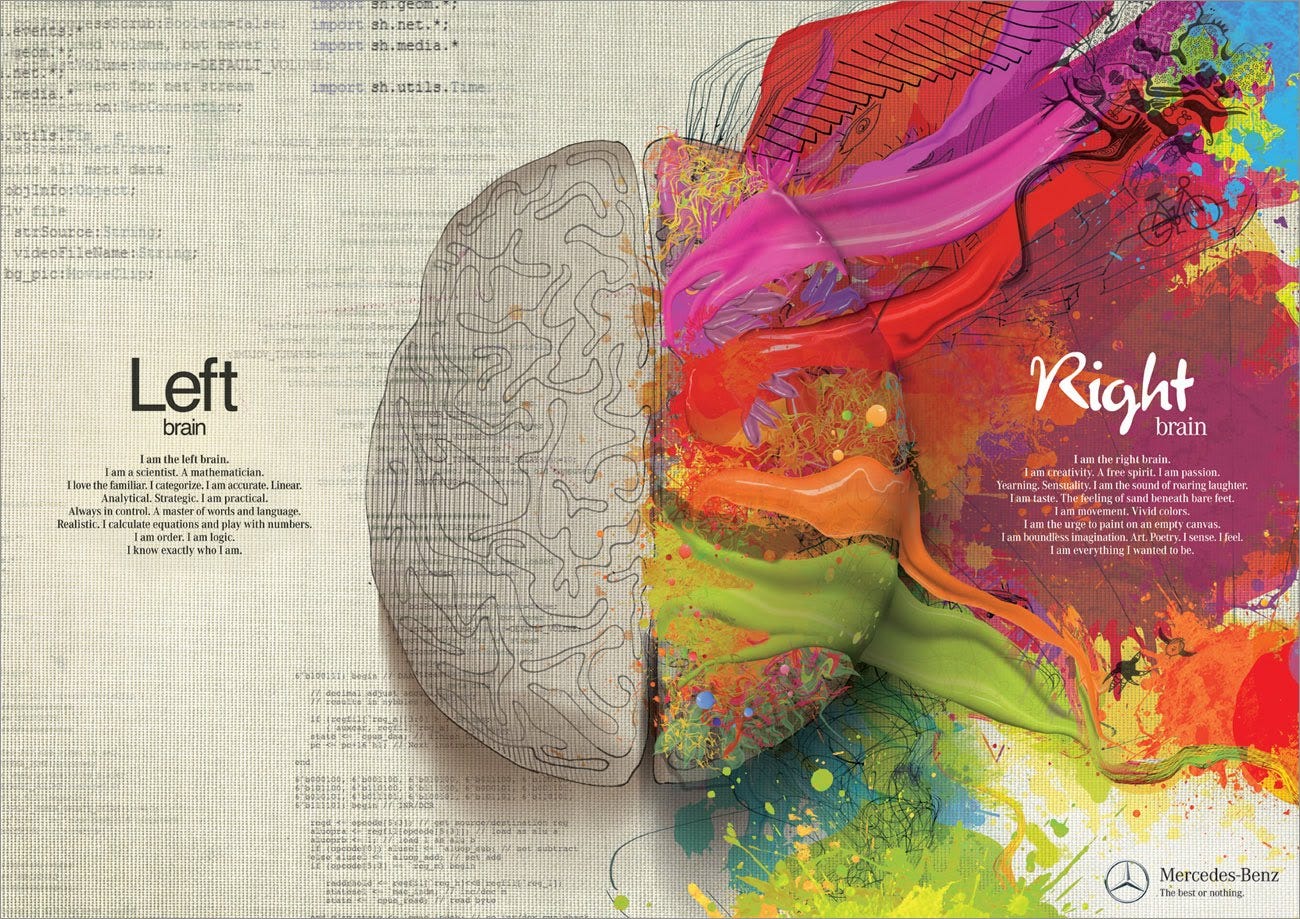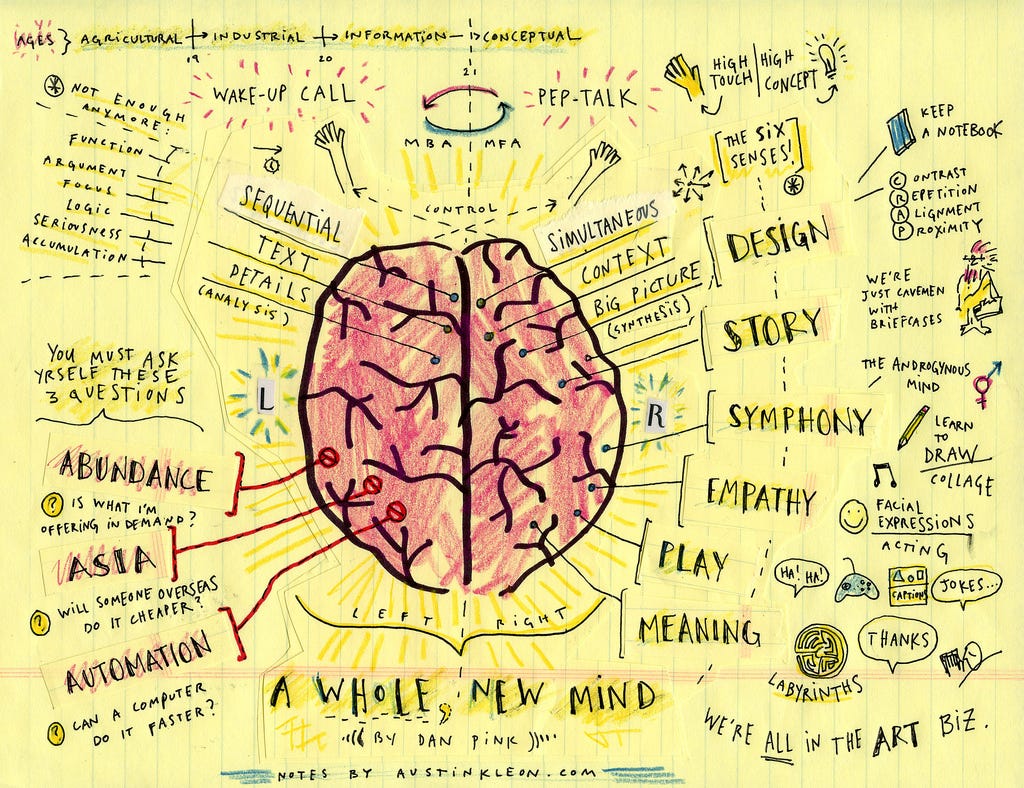Design. Story. Symphony. Empathy. Play. Meaning.
Your Six Essential Aptitudes
In the first installment of this conceptual thinking exploration (Test. Endlessly. Forever., we reviewed the basics of engaging in conceptual design and get straight to the point of application in daily life. I realize that not everyone is involved in in this practice, or accustomed to it, so I wanted to move right into exploring the conceptual thinker.
The Conceptual Thinker
An interesting review paper by Adele Diamond suggests that research on mirror neurons and research on the developmental time course of abstract thinking may be “missing the forest for the trees.” Conceptual thinking (abstraction as the thought process wherein ideas are distanced from objects) is neurological? Very interesting indeed.

By Nicky Poole, 889 Yoga Teacher and Yoga Community Leader
So what exactly is conceptual thinking? It’s easiest described as the ability to perceive and imagine, predict and hypothesize, and to conclude and reflect. Sounds a bit… right-brained. Conceptual thinking can certainly be considered a form of philosophy, as it indeed takes the understanding of other concepts to be able to create your own.
The last few decades have belonged to a certain kind of person with a certain kind of mind — computer programmers who could crank code, lawyers who could craft contracts, MBAs who could crunch numbers. But the keys to the kingdom are changing hands. The future belongs to a very different kind of person with a very different kind of mind — creators and empathizers, pattern recognizers and meaning makers. These people — artists, inventors, designers, storytellers, caregivers, consolers, big picture thinkers — will now reap society’s richest rewards and share its greatest joys.
As Daniel Pink points out in A Whole New Mind, about this very different kind of person, conceptual thinkers are those who could potentially be described as ambitious, independent, perfectionists, entrepreneurs, philosophers, intellectuals, & leaders. These qualities, or traits, or roles, usually come along with someone who thinks laterally, which is about reasoning that is not immediately obvious and about ideas that may not be obtainable by using only traditional step-by-step logic.
We are moving from an economy and a society built on the logical, linear, computer-like capabilities of the Information Age to an economy and a society built on the inventive, empathic, big picture capabilities of what’s rising in its place, the Conceptual Age. A Whole New Mind is for anyone who wants to survive and thrive in this emerging world — people uneasy in their careers and dissatisfied with their lives, entrepreneurs and business leaders eager to stay ahead of the next wave, parents who want to equip their children for the future, and the legions of emotionally astute and creatively adroit people whose distinctive abilities the Information Age has often overlooked and undervalued.
Often overlooked and undervalued. If you can relate to this feeling, maybe you’re just a conceptual thinker trapped in an old-world, average ecosystem. The conceptual thinker’s mind simply produces more questions and deep thoughts than what might appear in others. While others may be bored with concepts, ideas, and philosophies, a conceptual thinker might very well become fascinated and instinctively has the need to pursue them.
For nearly a century, western society in general, and American society in particular, has been dominated by a form of thinking and an approach to life that is narrowly reductive and deeply analytical. Ours has been the age of the “knowledge worker,” the well-educated manipulator of information and deployer of expertise. But that is changing. Thanks to an array of forces—material abundance that is deepening our nonmaterial yearnings, globalization that is shipping white-collar work overseas, and powerful technologies that are eliminating certain kinds of work altogether—we are entering a new age. It is an age animated by a different form of thinking and a new approach to life—one that prizes aptitudes that I call “high concept” and “high touch.” High concept involves the capacity to detect patterns and opportunities, to create artistic and emotional beauty, to craft a satisfying narrative, and to combine seemingly unrelated ideas into something new. High touch involves the ability to empathize with others, to understand the subtleties of human interaction, to find joy in one’s self and to elicit it in others, and to stretch beyond the quotidian in pursuit of purpose and meaning.
High concept…this reminds me a lot of the basis of Spiral Dynamics, which is a mashup of the new science of memetics with Gravesian value systems to form “value memes” or ”vMemes” to craft a model of transformational change, written by Don Beck & Christopher Cowan, a truly transformational study. Spiral Wizards are described as those who can instinctively roam over vast landscapes and see patterns and connections others do not notice because their old paradigm, “first tier” filters do not allow them to.
Such a person appreciates chaos and thinks more like a creative designer than a reengineer. The process links functions, people and ideas into new, more natural flows that add precision, flexibility, rapid response, humanity and fun to getting the work done. That is the power of new paradigm “second tier” thinking, to constantly survey the whole while tinkering expertly with the parts.

Map of a Whole New Mind by Austin Kleon
In the context of this article, I interpret the first tier filter as a “low touch” aptitude…or the simple aspirations of a “knowledge worker”; and second tier thinking can be described as that of the high concept thinker.
But what does that mean? Well, I’m not ashamed and often admit that when it comes to anything complicated, I’m too ignorant to have a useful opinion, or as Scott Adams has described as Ignorantselfishertarianism (for all you Dilbert fans). So, I’ll let Daniel Pink finish this off with an indirect, but acceptable answer…
As it happens, there’s a convenient metaphor that encapsulates the change I’m describing—and it’s right inside your head. Your brain is divided into two hemispheres. The left hemisphere is sequential, textual, and analytical. The right hemisphere is simultaneous, contextual, and synthetic. Of course, we enlist both halves of our brains for even the simplest tasks. And the respective traits of the two hemispheres have often been caricatured well beyond what the science actually reveals. But the legitimate scientific differences between the two hemispheres of the brain do yield a powerful metaphor for interpreting our present and guiding our future. Today, the defining skills of the previous era—the metaphorically “left brain” capabilities that powered the Information Age—are necessary but no longer sufficient. And the capabilities we once disdained or thought frivolous—the metaphorically “right brain” qualities of inventiveness, empathy, joyfulness, and meaning—increasingly will determine who flourishes and who flounders. For individuals, families, and organizations, professional success and personal fulfillment now require a whole new mind.
It is important to clearly identify yourself as a conceptual thinker or not, as there is a distinct difference between one who is a conceptual thinker and one who is not.
If you are a conceptual thinker… you should have known by now that you are at least ambitious, intellectual, and independent.
But if you’re still not sure , maybe the first tier filters haven’t been removed. Or maybe your mind hasn’t made the necessary transformation from low touch to high touch.
We think there’s someplace other than here to get to—that’s what drives the whole pursuit. Only when the pursuit ceases, is it possible to recognize what comprises you: pure being, pure consciousness. This is actually the very substance of your own self and being.
~~ Adyashanti_
The six essential aptitudes, or the “the six senses” on which professional success and personal satisfaction increasingly will depend, are not new and are not foreign concepts, and can be seen just about everywhere. To see some great examples, just check out the fine thinkers sprinkled about TED’s themes.
Design. Story. Symphony. Empathy. Play. Meaning.> These are fundamentally human aptitudes that everyone can master.

